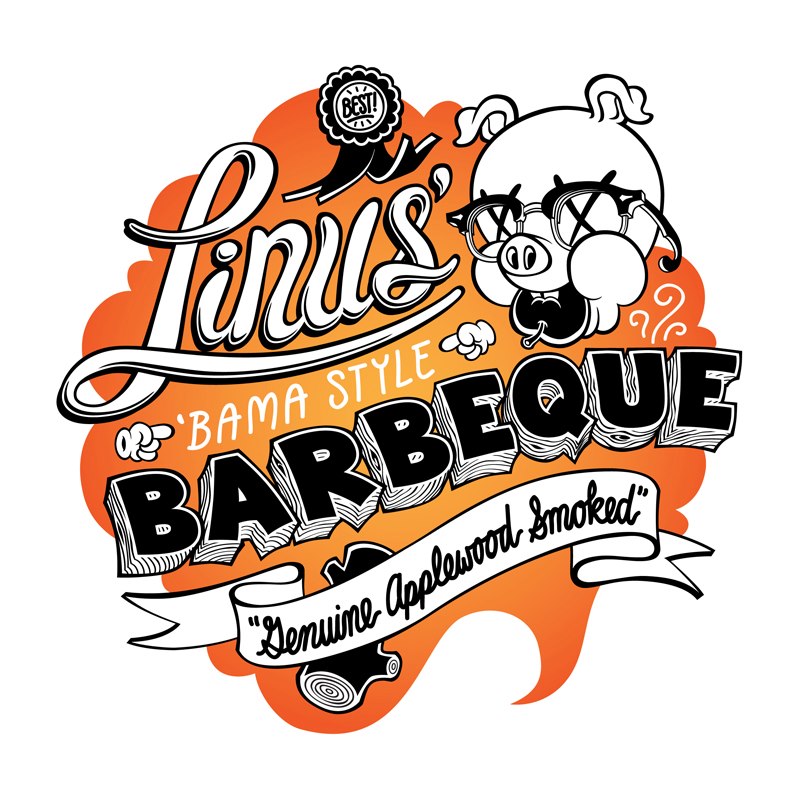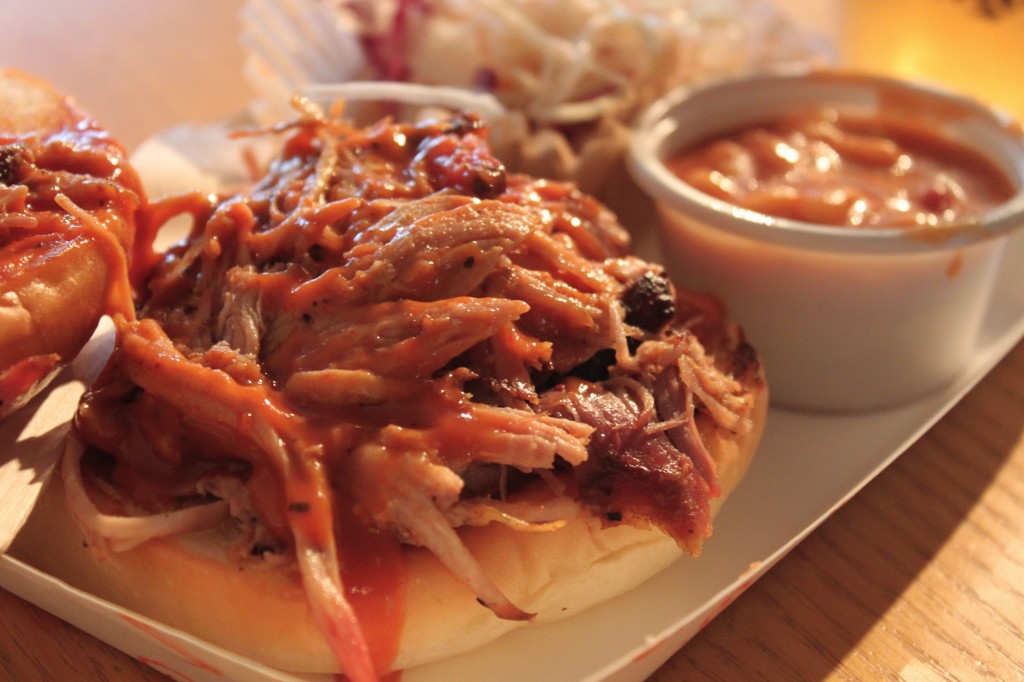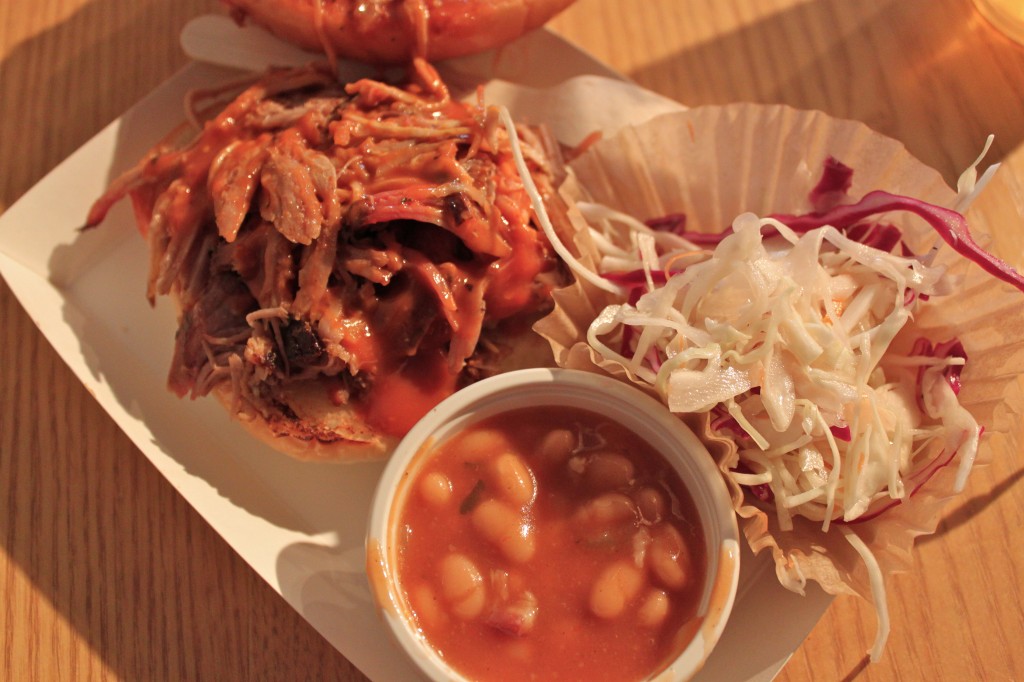I’m always on the lookout for things to do in Seoul that are different, especially if they are related to food in any way possible, so when Chincha?! listed a pop up barbecue in their weekly events post I immediately penciled it in for the weekend. I had attended one of Seoul’s first pop up restaurants back in April, and was excited to once again have the opportunity to sample some tasty culinary creations in a fun environment.
After eating at Linu’ Bama Style BBQ pop up event at Ways of Seeing in Itaewon and being blown away, I reached out to Linus in hopes of discovering more about what makes barbecue Bama style and what drove him to bring this style of cooking all the way to Korea.
Linus Kim, the man behind Linus Bama Style Barbecue, grew up in Birmingham, Alabama where barbecue is a way of life, even for Korean-Americans. He says, “Eating BBQ was like a staple growing up. My mom liked taking us to BBQ joints to feed me and my sister, Joan. We mostly ate pulled pork, sometimes in the most obscure, little places on old country roads. About 45 minutes north of Birmingham, there was an amazing place called Top Hat BBQ that we visited every weekend because our violin teacher was out in the sticks. We were probably the only Asians the patrons ever saw. We’d open the screen door..and it’s like the music would stop and everyone would turn their heads for a gander.”
As most expats in Korea know, it can be hard to find even decent version of your favorite non-Korean foods. It was this, in Linus’ words, “necessity” for good barbecue, that led him to begin creating Bama style barbecue here in Seoul.
Linus searched Seoul (and the Internet) for the necessary ingredients, and imported the “various equipment and special instruments” needed to make the perfect barbecue. He then began supplying delicious smoked goods to several restaurants in May. The impetus for starting pop up barbecues? According to Linus, “My clients love the smoke products but it’s been their prerogative to serve it the way their chef’s prefer. The pop-ups were meant to serve my smoked pork the way I like it. I put out an invite on facebook hoping maybe I could get 50 or so friends to come, but the response has been rather impressive.”
Before the barbecue I had very little idea about what constitutes Alabama style barbecue, being more familiar with the styles served in Kentucky and North Carolina. Linus explained that Alabama style barbecue has a lot of influences, and some that you might not expect. ” A little known thing about Alabama style food (and more specifically Birmingham style) is that there are influential generations of Italians, Lebanese, and Greek immigrants embedded in the population. All those spices were pervasive in all the food. It’s in the BBQ, but more obvious in the sides. For example, the vinegar based cole slaw (no mayo, ‘slaw in the raw’) that is popular in Birmingham BBQ joints is really a highjacking of Greek salad dressing. It’s Deep Southern American peasant food with old world influences.”
Cooking the Bama style barbecue, like most American barbecue styles, is a three part process that includes marinating, smoking, and a sauce that is added when served. Though Linus is dead set on keeping his sauce a secret (and rightfully so), he outlines the major steps in his cooking process that make his barbecue special, and make Alabama style different from the rest. “For Alabama style, the first marinating step is a dry rub. I first coat my pork with a sweet vinegar based solution that helps bind with my dry rub. The smoking process is long and involved (13-15 hours) that requires me to get up onto the roof at 5 in the morning if I want to finish up and hit the sack at a decent hour. It’s common for me to pull all nighters when I smoke a double load or if there’s particularly bad weather. The cooking time varies so much because I prefer to use charcoal and it is a big challenge to regulate the temperature to a consistent level (especially with wind blowing from the Han River). The first 4-5 hours are most crucial for smoking because that is when the meat is cool enough to absorb the smoke flavoring. I literally set a timer alarm to go off every 20 minutes so I can shake the ash from the coals, adjust for temperature, and get the smoke smoldering again. There is probably a camp of barbecue enthusiasts that think my process is excessive. There’s a saying in barbecue, ‘If youre lookin, then you ain’t cookin’, but my research has proven that this is not the case for me. But what can I say? I’m just obsessive about getting the right amount of smoke flavor into the meat. We mostly use hickory in the south, but since applewood is so abundant here I like to use as much of it as possible with the hickory to give it a sweet element.”
What can Linus tell us about the sauce? “Less is more. All my favorite places back home NEVER completely coat their pork in sauce. Often times they serve barbecue “dry” with the sauce on the side. For my sandwiches, I give a layering of sauce on top, but never slather and mix it to the point where you cannot taste the smoke and the meat. Customers shold be able to see the quality and know there was no liquid smoke flavoring involved (which is a way bbq places can cheat, by boiling or braising in the oven to reduce cooking time and covering up all the flaws with sauce till your left with something that looks like a stringy, barfy, sloppy joe).”
The plates served up at the event (10,000 won each) clearly showed the passion behind the food. The pieces of pork (hand pulled, never chopped or sliced, says Linus) were soft and smoky, and thin slices of dill pickles (something that is hard to find here in the land of sweet pickles) topped each sandwich. The coleslaw and baked bean sides completed the meal in true southern style.
The pop up barbecues have been a success, especially with help from Linus’ friends from Pudding Pop and Minimize Productions who made the promo video. A nod from hypebeast and write ups from the English language blogosphere in Korea have also helped create a buzz, but when asked about the possibility of a permanent location, Linus was a little hesitant. I am doing everything I can NOT to open a restaurant. I have a lot of family and friends in that business and it takes everything out of your life. That being said, a permanent place is likely, but I have a creative solution in the works. I also want to say that I really think that pop-ups are the way of the future. So many talented and passionate people have great ideas and little capital but they’re new to the business. Pop-ups are a great way to taste a tiny part of the business and test out your product in the market with minimal investment. In Korea, I heard an un-checked factoid that one out of sixty Seoulites (possibly Koreans) own or are in the restaurant business. That is a crazy high number, and just having lived here a year, I have seen so many restaurants open and disappear. Operating a restaurant is one of the most difficult jobs there is. You would be surprised how many people here open places on a whim, without any industry experience or even a solid menu in tact. In fact, the food itself seems to be an afterthought to the desire to open a restaurant. Pop-ups..they are the future. And you know it’s truly about the food.”
Linus’ enthusiasm for Alabama style barbecue was extremely apparent in the food that was served and I look forward to grabbing another meal when I can.
To stay up to date on all of Linus’ future events, head on over to his Facebook page. Thank you Linus for taking the time to answer all the questions and for serving up quality food!





I like Linus’ philosophy on the food business. And I surely love American BBQ of all types – Carolina, Memphis, Kansas City, Texas…etc. I hope he succeeds, bringing with him a wave of others interested in bringing American BBQ to Korea in full force. The dream is great craft beer and American BBQ like home here!!!
I agree, he has a wonderful attitude towards food! And if there’s BBQ AND craft beer in Korea, I may never leave
Nice write up! And thanks for the Chincha link. x
Loren recently posted..The Creators Project
Thanks, and thanks for initially putting this on my radar!
OK, I’m still none the wiser…what on earth is a pop-up barbecue? Like…yeah. I don’t get it (I’m not from the States as you know!)
However judging from the pictures, it looks and sounds AMAZING and I’ve liked the page on FB, so hopefully I’ll be able to get to an event soon.
Tom @ Waegook Tom recently posted..Going Scandinavian In Seoul
So, a pop-up restaurant is a temporary restaurant, often for one night, that allows people (or young chefs) to cook without the financial concerns of opening a restaurant. They are usually a lot of fun, too! In this case, it was a barbecue (pulled pork).
And yes, it was pretty amazing. Ever since I finished up this post last night I’ve been dreaming of meat…
I don’t know much about cooking and baking and all that, but nice to know the secret :). Maybe I’ll make it one day and don’t burnt my apartment :).
Agness (@Agnesstramp) recently posted..Travelling For Less Than $25: Floating Market, Damnoen Saduak, Thailand
Good luck, Agnes! I’m definitely too scared to try smoking anything